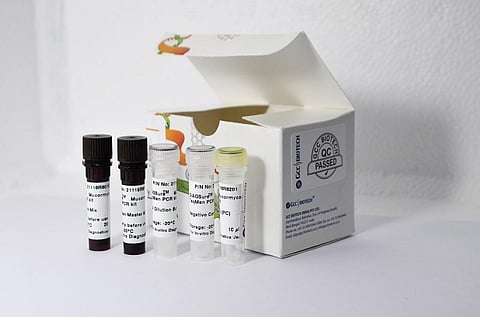

A group of scientists in West Bengal have developed an affordable diagnostic kit for mucormycosis, a fungal infection observed in patients with the novel coronavirus disease (COVID-19).
Diagnosis of the infection with available kits costs around Rs 7,000 because they are imported and the new technology will bring down this cost to Rs 800-1,000, according to Raja Majumdar, managing director of GCC Biotech Pvt Ltd, the company that developed the kit.
The company studies DNA, RNA protein has tied up with around 20 diagnostic centres in West Bengal as well as major private hospitals and pathology labs in Kerala, Maharashtra and Uttar Pradesh, Majumdar said.
Affordable tests can lead to early detection of the infection and prevent deaths, he added.
The DiAGSure Mucormycosis Detection Kit was approved by the Central Drugs Standard Control Organisation under the Directorate General of Health Services, Union Ministry of Health & Family Welfare on June 24, 2021.
It works on the ‘TaqMan principle’ that increases the specificity of quantitative PCR tests, used to detect infectious diseases.
Fungal DNA is isolated from clinical samples like buccopharyngeal or nasal swabs, bronchoalveolar lavage, serum and tears and subjected to real time PCR using the kit, much like COVID-19 diagnosis.
Amplification within a cycle threshold of 35 makes the sample positive. No amplification within 35 cycles indicates that the sample is negative, Majumdar said.
“Detection of signature genetic motifs in the DNA of the fungus helps identify it,” said Koustubh Panda, head of Department of Biotechnology and Guha Centre for Genetic Engineering & Biotechnology, University of Calcutta, who verified the kit.
The infection is caused because the COVID-19 impairs the cell-mediated immune response from T-helper cells, causing immunosuppression, the scientist stated.
The sample is analysed for one hour and ten minutes, he added. “The kit can detect up to 95 per cent of the mucor family.”
The molds that cause the infection breed mostly in tropical countries. They are incorrectly called ‘Black Fungus’ because the infections sometimes cause the skin and the nasal septum to turn black.
The fungi are commonly found in soil, plants as well as decaying fruits and vegetables. They also reside in the human respiratory tract in a dormant form.
The organisms flare up when patients are immunocompromised and cause life-threatening infections, primarily in the lungs and eyes.
Gairik Mukherjee, who is one among the 24 scientists who developed the kit, said:
A probable case definition can be stated: A patient suffering from or recovered from COVID-19 with symptoms of fever, cough, headache, shortness of breath, sinus congestion, black lesions on the top of the nose or inside the mouth. Their MRI or CT scan report of paranasal sinuses and orbit will also point to the same.
The company currently has the capacity to manufacture around three crore reactions of kits, according to Majumdar. They come in packs of 20, 50 and 100 tests.